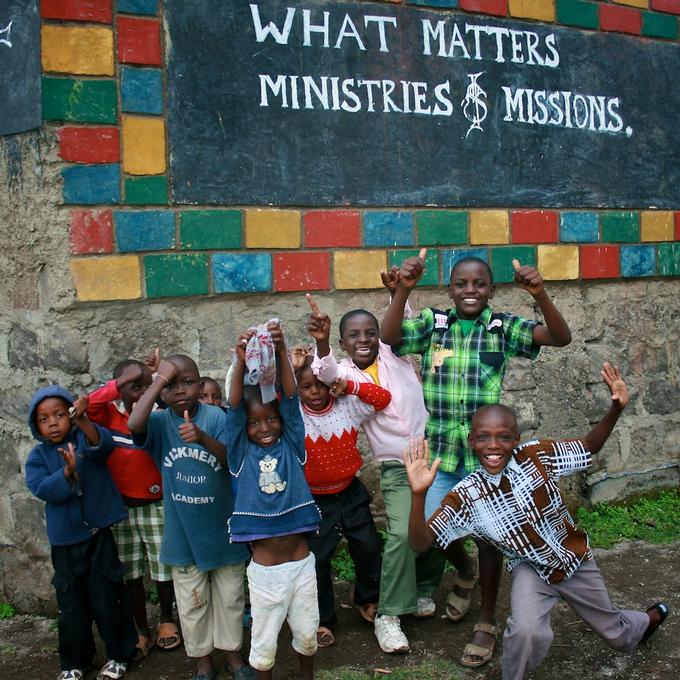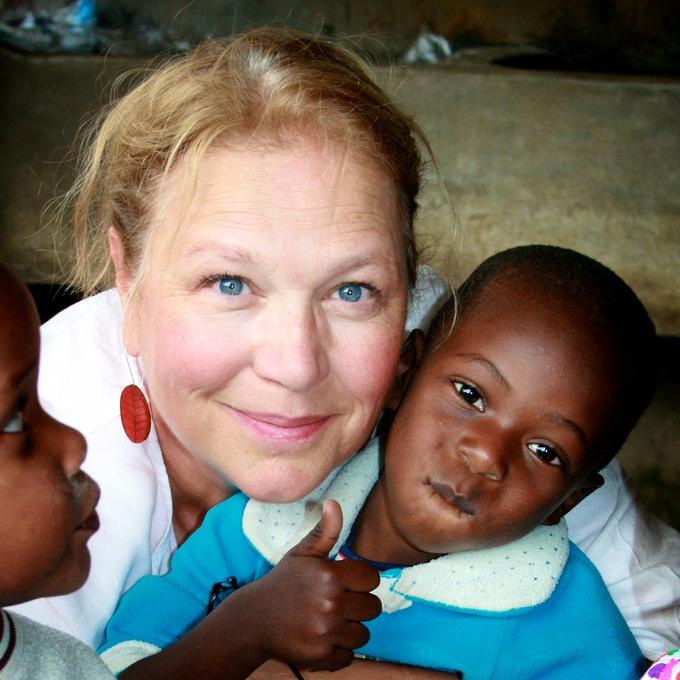Nakuru, Kenya
Our efforts in Nakuru, Kenya have been growing since our first trip in 2008. We have networked with government officials and schools in order to have the greatest impact. Below are some highlights of what we do.

Mama Ngina
Mama Ngina School is located in the heart of Nakuru, Kenya. This was our first project and came about when we were informed that children were fainting in the classrooms because they hadn't eaten. We had to do something.
We began by improving their outdoor kitchen area and then completed an inside kitchen facility. We also installed a Jiko (an industrial-sized stove and cooking pot). Now the children eat nutritious lunches. We provide the entire meal for many orphans and have improved the meals of hundreds more just by building a facility that can accommodate all of them. The grandmother of one of these orphans told us that she could not provide for her grandson. She said he wanted to attend school but couldn't because he often fell asleep or fainted in class. Since we have been involved, he not only began attending school but also caught up and finished his primary education and is on to secondary school. With tears in her eyes, she thanked us, saying he is now able to dream of a bright future, one she could have only wished for him. The schools in Kenya are very overcrowded and often have very poor facilities. A law was passed that allows all children to attend school for free as long as they own a uniform and a pair of black shoes. Kenya is also a country with an incredible amount of orphans due to the huge AIDS epidemic, many other diseases, and the internal conflicts between tribes. Orphans have a difficult time attending school, not only because of the uniform requirement, but also because they lack any regular substantial food source. They often have to use their days looking for anything that can fill their stomachs. We want to make a difference in orphans' lives, and that is why What Matters Ministries and Missions decided to reach out to as many schools as possible in Nakuru, Kenya.

Kaptembwa
In the slum of Nakuru, called Kaptembwa, hundreds of thousands of people live without jobs or medical care, and the children receive no education. It is here that What Matters Ministries and Missions has a clinic and feeding center. Each day upon arrival, our staff finds more and more children waiting at the entrance. Although we knew they would come for food, we soon realized that they also come because our premises provides a safe place to spend the day, free from abuse and loneliness. These children neither read nor write, and they are longing for someone to care for them. A teacher from a local school volunteered her time during the school’s vacation period, and she found the children eager to learn and grateful for her sacrifice. They are the most grateful children we have ever met. During warm afternoons while others play and enjoy the carefree afternoon that all children deserve to enjoy, our staff is often washing clothes, as well as children, with the only clean water they have access to. The clinic sees adults and children, and there are never enough of the very basic bandages and vitamins on hand. We also do home visits for the children who come to our center. The conditions are beyond description. There is no running water and no kitchen or bathroom facilities at all. One example of a home is that of three precious children who come to the center daily. They have nothing but one very small room where many children sleep together. It is made of mud with an old bed frame containing a filthy, matted substance that consists of stuffing, trash, rags, or whatever they can find. The dirt floor has typical children’s treasures: rocks, sticks, a couple bent pots, some shiny glass pieces, and a broken chair. The smallest child has a wooden box in which he or she hides everything of value in a corner under some trash. There is no lock on their broken door, and these three children live completely alone except for an occasional visit from an uncle. The What Matters Center is all the hope they have. But each day as evening draws closer, the facility must close and the children face the reality of their one-room mud shanties surrounded by thousands of others who have no food, warmth, or security.

Moi's Children Home
Another one of our outreaches in Nakuru is Moi's Children Home. This is a government-run orphanage that is overrun with desperation and need. The facility takes in the very youngest babies. These most-vulnerable, small, and precious children have a very difficult time. Because the orphanage is understaffed, they are often left in their cribs—two or three to a crib—where, because of a lack of stimulation and interaction, they lay languid and some eventually pass away. The oldest children on the property are in their teens, and they are relieved to at least live off the streets and are often the only ones in the dorms at night with all the younger children. Every visit is a life-altering experience because of the incredible children. We have taken a medical team, and we also take donations of balls, toys, and shoes. Experiencing the joy of each child as we fitted them with the only shoes they have had is tremendously humbling. Soon all of the children were in their new shoes, outside laughing and playing soccer with the little plastic balls.read more

Umojo Primary
Umojo Primary School, located in the heart of Nakuru, is one of two schools that we have been able to positively affect thus far. It is overcrowded, and the kitchen facilities were no more than a group of rocks on the ground with wood in the middle to heat the pots. We built a beautiful kitchen facility with two Jikos (industrial-sized cooking pots set on large stoves). Now they can cook safely in clean conditions and give much larger portions to the children who attend the school. The schools in Kenya are very overcrowded and often have very poor facilities. A law was passed that allows all children to attend school for free as long as they own a uniform and a pair of black shoes. Kenya is also a country with an incredible amount of orphans due to the huge AIDS epidemic, many other diseases, addiction, and the internal conflicts between tribes. Orphans have a difficult time attending school, not only because of the uniform requirement, but also because they lack any regular substantial food source. They often have to use their days looking for anything that can fill their stomachs. We want to make a difference in orphans' lives, and that is why What Matters Ministries and Missions decided to reach out to as many schools as possible in Nakuru, Kenya.
The Need
There are more than a million orphans in Kenya due to AIDS and more than two million orphans from all causes combined.
The life expectancy of a Kenyan is around 60 years. In 2003 the government passed a law that provided free education to every Kenyan child. Unfortunately, that did not include equal education opportunities or equal facilities. This new law caused a huge increase in the number of students, and the government was unable to build permanent school structures in order to meet the demand. Rudimentary mud and stick structures are still being used in many schools. Sanitary conditions were also not provided in the schools. Toilet pits with very poor enclosures are used, and there is no running water to wash hands after use. The average pit usage in the schools is 1 pit per 100 students. When these pits become full, they are loosely covered over by dirt, and a new one is dug in the same area. This makes for filthy, unsanitary conditions for the children. The average Kenyan child walks a long way to school each day—up to 4 miles in rural areas, enters a classroom of between 70-100 fellow students, and has no lunch. In order to attend school, the children must obtain the correct uniform and a pair of black shoes, although we found this more flexible in the most rural schools where children often go in whatever pieces of uniform they can find, often without any shoes at all. Lunch is not provided unless they can pay $3.50 US for a week of meals consisting of beans and corn maize. This epidemic weakens the nation as most adults have attended just 4 years of formal education, although the government requires 8 years.read more
Working with Impoverished Schools
Mama Ngina
We provide the entire meal for many orphans and have improved the meals of hundreds more just by building a facility that can accommodate all of them.
Making a Difference
What You Do Matters
to the work we are doing to feed orphans in Africa. 100% of your donation is tax-deductible. We ask you to consider becoming a monthly partner or giving a one-time donation.
Click Below
